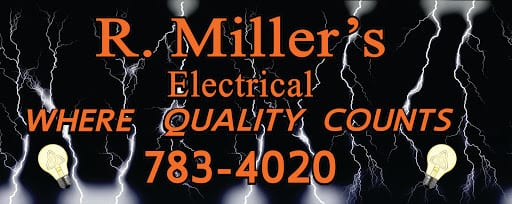Office Location
- 225 4 Avenue North
- Yorkton, SK S3N 0Z5
- CA
Phone
Open Hours
Fri: 8am – 4:30pm
Sat-Sun: Closed
miller3@accesscomm.ca
F.A.Q.
Electrical wiring can be confusing—here are some questions we commonly receive:
Three-pronged plug versus a two-pronged plug: what’s the difference?
The difference between the two is that the third prong on a plug acts as a grounding prong. Those that only have 2 prongs do not carry the same level of grounding as those carrying the third prong. If you see a plug that includes a third prong, they provide additional protection to yourself, your device, and your electrical system from the possibility of electrical shock. Do not tamper with or remove the third prong!
Is there a benefit of having whole-house surge protection?
When you have added whole-house surge protection to your residence, you are protecting all of the equipment in it from electrical surges rather than just those plugged into a single surge protector. This is especially helpful if you have a lot of electronic devices or appliances that need protection.
Are LED lights better than regular bulbs?
The significant difference between the two is that LED lights are more expensive upfront than incandescent lights, but they last a little over 41x longer (50,000 hours instead of 1,200 hours). LEDs run more efficiently and have a lower operating cost per year than the classic light bulb, making them a greener choice.
What is a low-voltage fixture?
These types of fixtures have a transformer that reduces their voltage. This is a great option for those wishing to reduce their voltage, but the downside is that these types of fixtures normally carry a higher installation cost. Transformers also tend to generate heat and can be tricky to mount.
What do I do if my appliances are always blowing the breakers?
The first step to take if your appliance has blown a breaker is to check to make sure there are not too many appliances plugged into the same circuit because this can cause it to overload. However, if this is just for one appliance, there could be something wrong with it. Unplug it and contact an appliance repair person or consider purchasing a replacement. If the outlet is still being problematic when another appliance is connected, it is recommended to have the circuit checked by an expert electrician.
Are a blown fuse and a blown circuit breaker the same thing?
When a fuse exceeds its electrical current limit, a burn forms a hole in the strip of metal, cutting off the flow of current, and “blowing the fuse”. When this happens, the fuse needs to be replaced by an electrician, not reset.
On the other hand, if a circuit breaker exceeds its current limit, the breaker trips, opening to stop the current from flowing. Breakers can be reset, unlike fuses, and flipping the handle on the face of the breaker resolves the issue.
When installing a ceiling fan, do I need a special kind of electrical box?
Yes—a ceiling fan is much heavier than most light fixtures and is actively in motion. You will need a special box for mounting this application. We recommend Saddle Boxes for the average fan (up to 35 pounds).
What is a GFCI?
Do you have an outlet in your bathroom or your kitchen? If so, there is a good chance it is a CFCI (ground fault circuit interrupter). These types of outlets have a “test” and “reset” button in the middle. They automatically shut off the electrical circuit when the current flows incorrectly, or dampness is detected to protect you and your loved ones from electrical shock.
